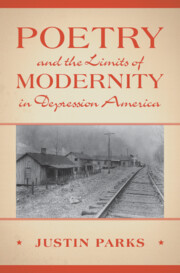Book contents
- Poetry and the Limits of Modernity in Depression America
- Cambridge Studies in American Literature and Culture
- Poetry and the Limits of Modernity in Depression America
- Copyright page
- Dedication
- Contents
- Illustrations
- Acknowledgments
- Introduction
- Part I Historical Materialism and the Materials of History
- Chapter 1 Thinking with Things
- Chapter 2 New Ways of Seeing
- Chapter 3 Pieces of the Body Torn out by the Roots
- Part II Ethnographic Modernity and Its Discontents
- Notes
- Works Cited
- Index
- Recent Books in this Series (continued from page ii)
Chapter 1 - Thinking with Things
Language, Commodities, and the Social Ontologies of Objects in Louis Zukofsky’s “A”-8 and -9
from Part I - Historical Materialism and the Materials of History
Published online by Cambridge University Press: 21 September 2023
- Poetry and the Limits of Modernity in Depression America
- Cambridge Studies in American Literature and Culture
- Poetry and the Limits of Modernity in Depression America
- Copyright page
- Dedication
- Contents
- Illustrations
- Acknowledgments
- Introduction
- Part I Historical Materialism and the Materials of History
- Chapter 1 Thinking with Things
- Chapter 2 New Ways of Seeing
- Chapter 3 Pieces of the Body Torn out by the Roots
- Part II Ethnographic Modernity and Its Discontents
- Notes
- Works Cited
- Index
- Recent Books in this Series (continued from page ii)
Summary
This chapter proposes that Louis Zukofsky’s ongoing work on his long poem “A” was animated by a strong investment in restoring a sense of language’s historical and material situatedness – its social ontology – as a means of combatting what Zukofsky and other contemporary writers saw as its vulgarization within an emerging commodity culture. I argue that in the eighth and ninth sections of “A,” written between mid 1935 and early 1940, Zukofsky equates labor and language, revealing both to be historically contingent and socially produced. I begin the chapter by returning to the debate between Zukofsky and Ezra Pound over the concept of the commodity to reveal an under-discussed aspect of their quarrel, namely its basis in the two poets’ attitudes concerning language’s relation to materiality. I then move on to align the treatment of the commodity in “A”-8 and (the first half of) “A”-9, an often-discussed aspect of these sections, with their seldom noted but equally important thematization of language. Focusing on the equivalences the poem draws between labor and language, I claim that the project of restoring both to their concrete historical conditions of social production furnishes a key to reading Zukofsky’s long poem.
Keywords
- Type
- Chapter
- Information
- Poetry and the Limits of Modernity in Depression America , pp. 25 - 44Publisher: Cambridge University PressPrint publication year: 2023



